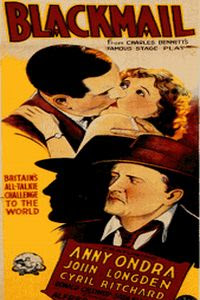
Director: Alfred Hitchcock
Cast: Anny Ondra, John Longden, Cyril Ritchard, Donald Calthrop
Background: Blackmail was originally intended to be a silent film, but the popularity of talkies convinced producers to film a sound version as well. Lead actress Anny Ondra's voice had to be dubbed for the sound version, as her Czech accent did not work for the character. Both sound and silent versions were released, as many theaters were still not equipped with sound equipment. The sound version is considered Britain's first all-talkie film.
Story: Alice White (Ondra) ditches her date, Scotland Yard detective Frank Webber (Longden), so she can meet up with a painter (Ritchard). When the man tries to rape her, she grabs a knife and kills him. Alice flees, but one of her gloves his found by Frank when he arrives to inspect the scene. His attempt to hide the evidence is discovered by a thief (Calthrop), who tries to blackmail the pair.
Thoughts: As in many other early talkies, there are some problems with the line delivery, especially absurdly long pauses in between each actor's lines. Ondra is a wonderfully expressive actress, but the dubbing makes some of her moments feel awkward. Having seen some of the scenes of the silent version, her performance (not to mention the film) was much better there without the added distraction. Still, this is a pretty good early Hitchcock film that showcases some of the skill that would make him a legend in the coming years. The offscreen rape and murder is brilliantly handled, as Hitchcock makes it clear what happened by only showing two different arms appear in the frame. The extended sequence where the thief blackmails the couple is top notch stuff, maintaining a strong tension eventhough not much is happening. With this film and The Lodger, you can see the skill of the young Hitchcock that would eventually be fully realized in later films.
Postscript: Anny Ondra's acting career was over in England, so she moved back to Czechoslovakia and in 1933 married boxing champion Max Schmeling. She was portrayed by Peta Wilson in the 2002 tv-movie Joe and Max. It would be another six years before Hitchcock would make what is regarded as his first classic, The 39 Steps.












